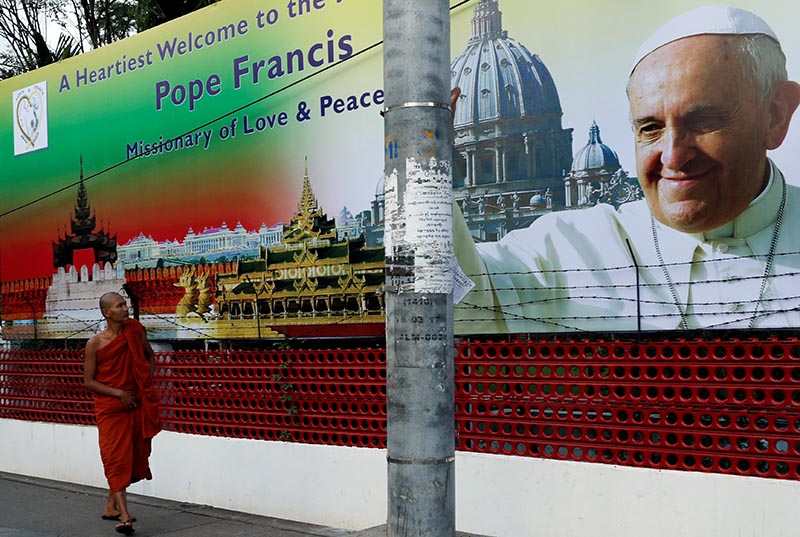Thousands travel to Yangon for Pope's diplomatically fraught trip
YANGON: Thousands of Catholics gathered in Yangon on Monday after journeys by train and bus, excited to get a glimpse of Pope Francis, who begins a trip to Myanmar fraught with diplomatic risk over its treatment of the minority Muslim Rohingya people.
"We come here to see the Holy Father. It happens once in hundreds of years," said Win Min Set, a community leader who brought a group of 1,800 Catholics from southern and western states of the country.
"He is very knowledgeable when it comes to political affairs. He will handle the issue smartly," he said, referring to the delicacy of the pope's discussions about the Rohingya.
The trip is so delicate that some papal advisers have warned him against even saying the word "Rohingya", lest he set off a diplomatic incident that could turn the Buddhist-majority country's military and government against minority Christians.
More than 600,000 Rohingya have fled from Rakhine state to southern Bangladesh since the end of August, when Rohingya militants attacked security posts and the Myanmar army launched a counter-offensive.
US Secretary of State Rex Tillerson last week called the military operation "ethnic cleansing" and threatened targeted sanctions for "horrendous atrocities".
Amnesty International said the Rohingya and Muslims generally in Rakhine state have been subjected to "systemic social and political exclusion" for decades and accused the military of "crimes against humanity" in the last two years, including murder, rape torture and forcible displacement.
Myanmar's government has denied most accusations, and the army says its own investigation found no evidence of wrongdoing by troops.
Myanmar does not recognise the Rohingya as citizens nor as members of a distinct ethnic group with their own identity, and it even rejects the term "Rohingya" and its use.
Many people in Myanmar instead refer to members of the Muslim minority in Rakhine state as illegal migrants from Bangladesh.
This poses a dilemma for Francis as he visits a country of 51 million people where only about 700,000 are Roman Catholics.
'SOMEONE SHOULD HAVE TALKED HIM OUT OF IT'
The most tense moments of his visit are likely to be private meetings with the army chief, Senior General Min Aung Hlaing and, separately, civilian leader Aung San Suu Kyi.
Francis will also visit Bangladesh during his Nov. 26-Dec. 2 trip, where he is expected to meet Rohingya refugees.
Large numbers of riot police were mobilised in Yangon, Myanmar's biggest city, ahead of the pope's arrival, which was expected at 1:15 p.m. (0645 GMT). But there were no signs of any protests along the pope's route from the airport to the archbishop's residence in the city centre.
More than 150,000 people have registered for a mass that Francis will say in Yangon on Wednesday, according to Catholic Myanmar Church spokesman Mariano Soe Naing.
"I hope he will bring a change in politics," said Tunan Lahtoi, 25, who travelled by train for two days and one night from Kachin state in the far north to see the pope.
Vatican sources say some in the Holy See believe the trip was decided too hastily after full diplomatic ties were established in May during a visit by Suu Kyi.
Suu Kyi's global esteem as a Nobel Peace Prize laureate has been tarnished because she has expressed doubts about the reports of rights abuses against the Rohingya and failed to condemn the military.
"I have great admiration for the pope and his abilities, but someone should have talked him out of making this trip," said Father Thomas Reese, a prominent American author and analyst at Religion News Service.
The pope has already used the word Rohingya in two appeals from the Vatican this year.
Asked if he would say it in Myanmar, Vatican spokesman Greg Burke said Francis was taking the advice he had been given seriously, but added: "We will find out together during the trip ... it is not a forbidden word".






